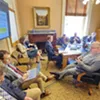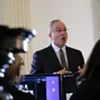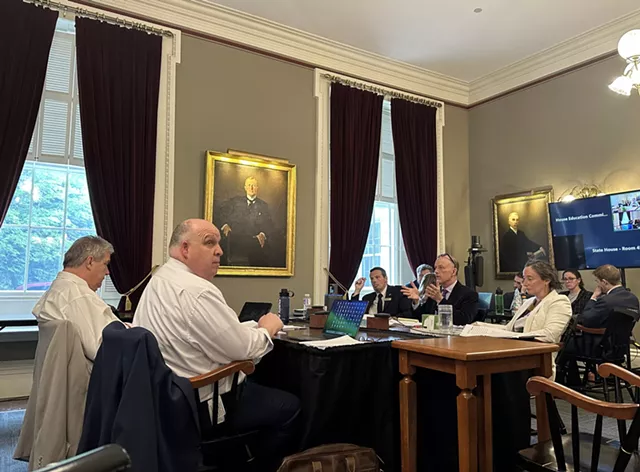The task before the Vermont House and Senate this week seemed relatively straightforward: resolve somewhat minimal differences in their two versions of an education reform bill, pass it by Friday night and adjourn.
A conference committee, made up of three state representatives and three senators, convened on Tuesday afternoon to work toward a compromise. By Friday morning, it appeared as if they were making slow but steady progress. A late-night adjournment seemed within reach.
Committee Hashing Out Education Reform Bill Jumps the Gun

Committee Hashing Out Education Reform Bill Jumps the Gun
By Kevin McCallum
News
But on Friday afternoon, the senators on the conference committee — Seth Bongartz (D-Bennington), Ann Cummings (D-Washington) and Scott Beck (R-St. Johnsbury) — effectively derailed the process by introducing a number of entirely new provisions they wanted to see in the bill. One of them would have allowed school districts, with approval from local voters, to spend 10 percent less than the state-set foundation formula. Several others seemed designed to cater to the interests of independent schools. Bongartz served for 15 years as chair of the board of one such school, Manchester’s Burr and Burton, and Beck teaches at another, St. Johnsbury Academy.
House committee members — Reps. Emilie Kornheiser (D-Brattleboro),
Peter Conlon (D-Cornwall) and Chris Taylor (R-Milton) — were caught off guard by the Senate’s proposed additions.
“I am concerned that passing a completely unvetted proposal will … cause significant damage to people’s property tax rates and trust in government and schools,” Kornheiser told the senators sitting across the table.
Senate Passes Education Reform Bill After Days of Political Wrangling

Senate Passes Education Reform Bill After Days of Political Wrangling
By Alison Novak
Education
As late as 10 p.m. on Friday, it still seemed as if there could be a resolution, albeit a messy one. On the Senate floor, Senate President Pro Tempore Phil Baruth (D/P-Chittenden-Central) told his members that he believed the conference committee had “momentum” and would aim to take a vote on the bill later that night.
“The way I think about it is the constituents, my constituents, sent us here for this night because they want us to do our work,” Baruth said. “They want us to finish it up, pay strict attention, and then be done and go home.”
That turned out to be wishful thinking.
At 11 p.m., the Senate met again on the floor and Baruth told them that they should go home for “a good night’s sleep.” The conference committee members would pick up their work at 9 a.m. on Saturday, with the goal of striking a deal that afternoon, he said. The Senate would then reconvene at 2 p.m. on Saturday.
“We will have another version of this tomorrow, with attendant uncertainty and tension, trying to get to the end,” Baruth said.
It was widely assumed that the House would follow suit. It did not.
At 11:30 p.m., House Speaker Jill Krowinski (D-Burlington) told the body that after meeting with her conference committee members, representatives from the governor’s office and Senate leadership, she had decided on a different game plan.
Instead of coming back the next day, Krowinski said, the House would adjourn until Monday at noon. The conference committee, she said, would continue to meet and try to reach an agreement, but no vote on the bill would occur until the veto session, which is slated to start on June 16.
The lack of coordination between the Senate and House in the final hour of a marathon day indicated a growing rift that may prove hard to repair.
The Learning Lobby: As Legislators Seek to Transform Education in Vermont, Lobbyists Make the Cases for Schools Public and Private

The Learning Lobby: As Legislators Seek to Transform Education in Vermont, Lobbyists Make the Cases for Schools Public and Private
By Hannah Bassett
Ways and Means
Even if the two chambers are able to resolve their differences, it is still unclear whether they will be able to reach an agreement that will satisfy Gov. Phil Scott.
Earlier this week, Scott sent a letter laying out his expectations for the legislation. He said he would not support a bill that spends more on education than the current system does. He also proposed implementing a new funding formula and governance structure in July 2027 — two years earlier than the date in both the House and Senate versions of the bill.
Sen. Tanya Vyhovsky (P/D-Chittenden-Central) said lawmakers this session should have focused on tax reform ideas that actually save voters money instead of trying to overhaul the education system. And making such sweeping reforms at a late hour made no sense, she said, and was an outcome some like her had long predicted.
“This is some of the most consequential policy that any of us will ever vote on, and this is how we do it?” she said. “It’s embarrassing.”
Kevin McCallum contributed reporting.

